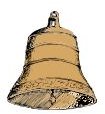"For Whom the Bell Tolls": Analysis of Dunne's Poetry
“For Whom the Bell Tolls” by John Donne
Before doing a “For Whom the Bell Tolls” analysis, read and reread it. Donne is easier to understand if read OUT LOUD (lock yourself in the bathroom if you’re embarrased to be heard reading it in public.) I’ve provided a copy. I urge you to print it and write on it.
- No man is an island,
- Entire of itself.
- Each is a piece of the continent,
- A part of the main.
- If a clod be washed away by the sea,
- Europe is the less.
- As well as if a promontory were.
- As well as if a manor of thine own
- Or of thine friend’s were.
- Each man’s death diminishes me,
- For I am involved in mankind.
- Therefore, send not to know
- For whom the bell tolls,
- It tolls for thee.
Poetic Devices

- There is no rhyme scheme or standard meter. The passage is from John Donne’s Meditation XVII and was not initially a poem in and of itself.
- Extended Metaphpor - Lines 1-4 compare a “man” to a piece of a continent.
- Simile - Lines 5-9 contains a simile, comparing a clod being washed away by the sea to an individual’s loss of life.
- Allusion - Lines 12-13 contain an allusion. Before radios, newspapers, and TVs, major town events were announce by the tolling of the bells. The bell-tolling to which Donne refers in the poem would be funeral bells. A tolling bell is also a metaphor for someone dying.
- Line Length - The short final line of the poem emphasizes the poem’s message that when one dies, a part of everyone dies.
- Word Choice - note the hard t-sound used in the last line contrasted with the rolling w and l sounds in the previous line. The change jolts the reader and adds further emphasis on the message in the last line.
- Sounds within the Last Line - Further emphasis is placed on the last word as the harsh sounding long e jolts the reader after he’s been lulled by the soft long o in tolls.
- Anaphora - The repetition of words at the beginning of clauses or phrases occurs in lines seven and eight.
- <strong>Alliteration</strong> - “Death diminishes” in line 10 draws attention to the poem’s theme that all are connected and that when one suffers, all suffer.
Analysis Paragraph
John Donne in “For Whom the Bell Tolls” demonstrates the connection all humans have with one another. Lines 1-4 contain a metaphor comparing all living people to a continent. Lines 5-9 contains a simile explaining that when one piece of the continent washes away, regardless of size, then the entire continent is affected. Line one emphasizes this interconnectedness with the claim that “No man is an island.” Donne draws further attention to the theme with sound devices: (1) the alliteration of “death diminishes in line 10 draws the reader’s attention to the notion that death diminishes all; (2) the juxtaposition of Anglo-Saxon and Latin-sounding words bring added emphasis to thee in the last line, jolting the reader into reality and answering the question “For whom the bell tolls?”

For instructions on how to write your own analysis, look at this Robert Frost example.
References
- Images are in the public domain.
- Donne, John. “For Whom the Bell Tolls.”
This post is part of the series: John Donne Study Guide
The bell tolls for thee if you don’t prepare for your next poetry quiz. Start here.
